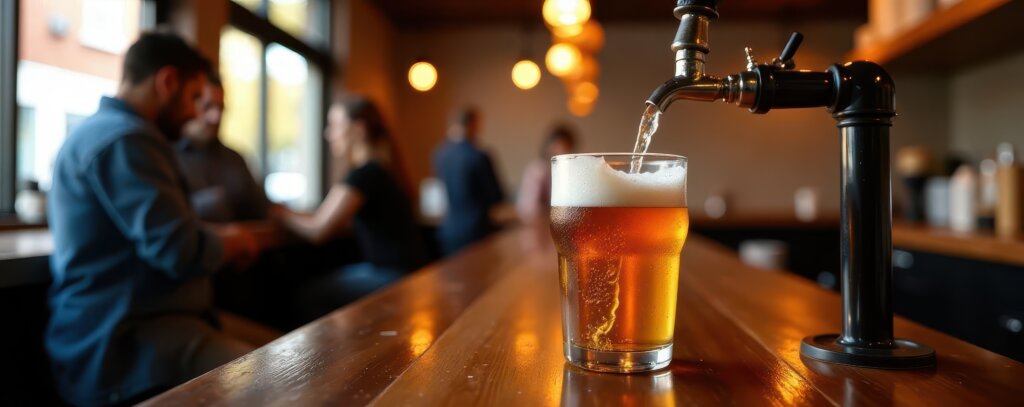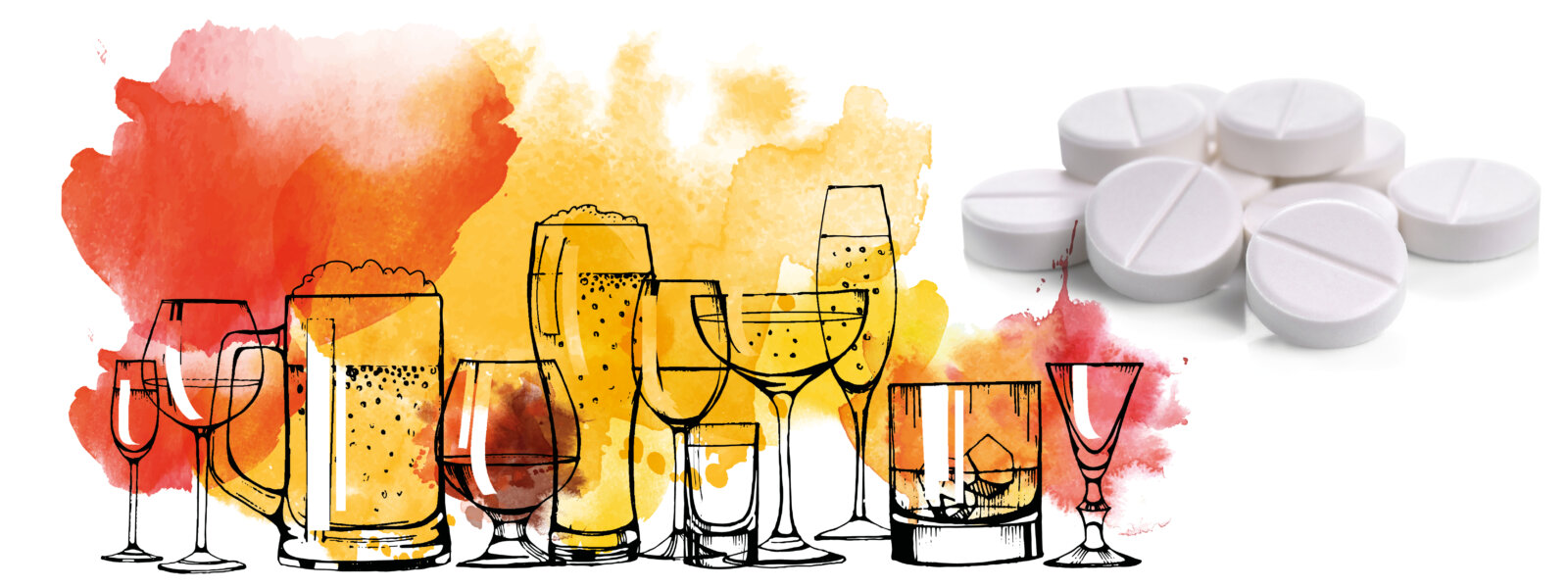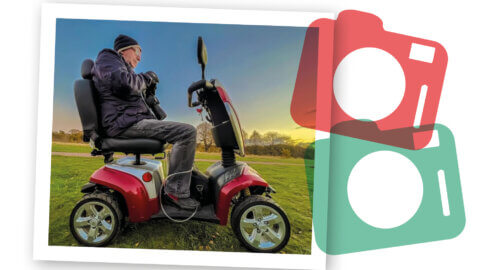Alcohol and PH: What you need to know
If you’re newly-diagnosed with pulmonary hypertension, you might be wondering whether you can still enjoy a drink. We hear many questions in our community around this topic, so this feature aims to shed some light and help you make informed decisions.
A nurse’s view…
Carl Harries, Lead Clinical Nurse in the Royal Brompton Hospital’s PH service, has 22 years’ experience of caring for people with pulmonary hypertension.

“Having PH does not exclude you from having a good time, whether that includes alcohol or not. For some people, alcohol simply isn’t part of their lives, but for some people it is. We need to be realistic about that, and to give patients credit – it’s not for us to lecture on safe limits.
A lot of people newly diagnosed with PH will ask if they are ‘allowed’ to drink and we need to normalise this question. They ask if they are able to have the odd drink at a party, or if they drink a fair bit, whether they can continue with that. My answer is always the same…
There are only two reasons you would need to be a bit careful with alcohol if you have PH – one is if you are on warfarin and the other is if you are on diuretics (see the question and answers on page X). However, neither of these are significant issues and are easily managed. You simply need to be aware of them.
The answer to whether you can continue to enjoy a drink, is simply ‘yes’. It’s important to continue to enjoy social engagements, and to live a life beyond your illness.
Drinking alcohol is personal choice, and you don’t need to have a diagnosis of pulmonary hypertension to drink sensibly. I take a real-world view on this!”
How much do people with PH drink in the UK?
In 2023 we conducted a survey of the eating and drinking habits in our PH community, to help us tailor effective support.
Over 600 people responded, and the findings showed that:
- 35% of people with PH never drink alcohol
- 22% drink once a month or less
- 16% drink 2-4 times a month
- 18% drink 2-3 times a week
- 9% drink 4 or more times a week
How does this compare to the general population? A 2021 NHS Digital survey showed that 21% of adults has not drunk alcohol in the last year, and 49% drink alcohol at least once a week.
Medication and drinking
The most important thing to mention is that there are no known interactions between alcohol and PH-specific therapies. That means the tablets, or the nebulised or intravenous medicine you take to treat your PH, won’t be affected by consuming alcohol. Drinking won’t make it less effective or cause unwanted side effects.

Dr Neil Hamilton, Consultant Pharmacist at the Sheffield Pulmonary Vascular Disease Unit, explains more about medication and alcohol….
“My aim here is to try and dispel some myths and bring some reality to discussions that I frequently overhear, and address questions we pharmacists get asked around drinking and medicine. Much of this advice is not unique to patients with pulmonary hypertension and consists of general tips and considerations applicable to all.”
Can I drink if I take warfarin?
Patients prescribed warfarin can safely consume alcohol, provided it is in moderation. A steady, regular intake of two units per day is preferable to 14 units* in one night. Binge drinking close to an INR (international normalised ratio) blood test check may well affect the result, so be aware, and if you have drunk more than usual near to a blood test, just let the clinic know so they can interpret the result in context.
Can I drink on antibiotics?
This depends on which type of antibotics. There is no blanket advice across antibiotics. As you may be aware there are many different medicines we treat infections with, so make sure you check with your doctor and / or pharmacist to be certain. The ones to definitely avoid alcohol with are metronidazole and tinidazole. Others that can be problematic are co-trimoxazole, linezolid, doxycycline, nitrofurantoin and erythromycin. The NHS website (www.nhs.uk) has more helpful advice on this subject.
Will I be visiting the toilet all the time if I take my diuretics whilst drinking alcohol?
My advice here is to take care. Alcohol does have a ‘diuretic’ effect, causing you to pass more water. Patients with any tendency towards fluid retention should take care when drinking beer, cider or anything ordered in larger volumes (such as pints). I would also urge some caution if taking diuretics when consuming significant amounts of alcohol as the added diuretic, and therefore dehydration, effects would be potentially damaging to the kidneys and blood salt levels if repeated regularly. If you know you will be drinking in the evening, I suggest taking your diuretic medication in the morning, to lessen the chances of you needing lots of visits to the loo.
Can I drink on painkillers?
This depends on which ones. Strong painkillers such as ‘opioids’ – which includes morphine, tramadol and codeine – all have the potential to cause drowsiness and nausea. This will be enhanced by alcohol. Sensible advice here is to avoid alcohol altogether when starting a new painkiller and also immediately after a dose increase. This way you can assess how the change is affecting your body.
Is it ok to drink if I take anti-depressants?
Coping with a debilitating condition such as PH can be stressful and cause anxiety, depression and other mental challenges. There are some interactions between some of the older anti-depressants, but these are far less frequently prescribed nowadays. Newer treatments are likely to be preferable but it is always worth checking if in any doubt.
“If you take your medication via an IV line or a nebuliser, my advice is that you avoid making up your pump or nebuliser after drinking alcohol. These tasks require concentration and a sterile environment, both of which can be impaired by drinking. If you know you will be having a few drinks, it’s best to plan to do all this beforehand. If you are on oral medications, you may wish to take these earlier in the day too, to lessen the risk of forgetting.
For many of us, drinking alcohol socially is a pleasure, and as with lots of things in life, enjoying a drink in moderation is unlikely to interact too much with commonly prescribed medication.
Sticking to the government’s safe alcohol limits of 14 units per week is applicable to us all, as the evidence suggests this reduces health risks. Your pharmacist, either locally or at your specialist centre, will be happy to advise on alcohol in relation to your specific treatments.”
More choice than ever…
If you choose not to drink at social gatherings, gone are the days of Diet Coke being your only option. The alcohol-free drinks industry is booming, and supermarkets, pubs and restaurants now stock a wide range of low-or-no-alcohol beers, wines, and spirits. Most establishments also have an impressive menu of mocktails too.
Found an alcohol-free drink you want to shout about? Email media@phauk.org and we’ll share your recommendations…

Understanding units
The NHS recommends that to keep health risks from alcohol to a low level, if you drink most weeks, you should stick to no more 14 units a week. This is the same for both men and women. But what does that look like in reality?
A single (25ml) measure of vodka, gin, rum, or whisky = 1 unit
A pint of average-strength (ABV* 5%) lager, beer, or cider = 3 units
A medium 175ml glass of wine (ABV 12%) = 2.1 units
A large 250ml glass of wine (ABV 12%) = 3 units
*ABV stands for Alcohol By Volume, and is a standard measure of how strong a drink is
- Unsure how many units are in your drink of choice? Try this handy online calculator by Drinkaware to work it out.
Fancy tracking your drinks?
If you think you’d find it helpful, there are now lots of free apps around that allow to track what you’re drinking and calculate your units, calories, and even what you’re spending on alcohol. Try My Drinkaware (which also allows you track your sleep), DrinkControl, or Drink Free Days (which is produced by the NHS).
If you would like help to reduce your drinking, contact your GP who can provide you with advice or refer you for extra support in your area. You’ll also find advice, support, and resources via the UK-based charities Alcoholchange.org.uk and Drinkaware.co.uk.
















